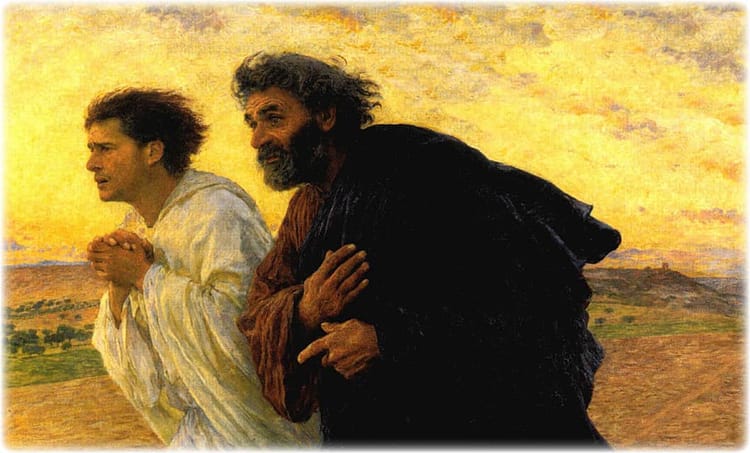Four Commands – One Goal (1 Peter 4:7-11)

Big Idea: Christians should prepare for Christ's return by staying prayerful, loving earnestly, offering hospitality, and using their spiritual gifts, all for the glory of God.
I like people who don't beat around the bush. I sometimes feel like saying, "Give me the bottom line – spare me the details!" I also like people who tell it as it is, and that's why Peter is my type of person. He doesn't dance around the issues – he just says what he wants to, cuts through the red tape, and gets down to business. When Peter, the big fisherman, took up his pen to write about suffering saints, he cut to the chase. And when he addressed the reality of the end times, he summed up his game plan in a one-two-three fashion. No beating around the bush. Four commands, and one goal.
"The end of all things is near" (1 Peter 4:7). Peter observes Nero's strange behavior and the impending persecution, realizing that his own time may be limited. He concludes that the end is near. Jesus was coming back to bring a dramatic end to the world and everything in it. Peter knew that the next major event on God's calendar was the return of Jesus Christ.
I've noticed today that we make two mistakes when it comes to thinking about the second coming. The first mistake is to think we have it all figured out. Early in his ministry, Warren Wiersbe gave a message on prophecy that tried to explain everything about the second coming. A pastor friend came up at the end of his message and said, "Brother, you must be on the planning committee for the return of Christ!" Wiersbe got the point, but his friend added quietly, "I've moved from the planning committee to the welcoming committee." Some make the mistake of thinking that they've got it all figured out. It's important to study the word of God and learn about the Second Coming, but we should approach it with humility.
The mistake that you and I make more often, though, is to forget that Jesus is coming back again. One out of every 30 verses in the Bible mentions the subject of Christ's return or the end of time. Of the 260 chapters in the New Testament, there are well over 300 references to the return of Christ. Only 4 out of the 27 New Testament books fail to mention Christ's return. One-twentieth of our entire New Testament is dedicated to the subject of our Lord's return. Christ spoke of his return often, especially after he had revealed his death – never in vague or uncertain terms. In the first century, his followers often preached about and mentioned his return in their teachings and writings. We don't know when, and we don't know all the details, but we do know that Jesus is coming back again.
One day, the disciples made their way to Jerusalem. It would be the equivalent of a prairie boy visiting Toronto. They were staring at the temple – in modern terms, it would be like looking in awe at the CN Tower, the bank buildings. Becoming enamored with faster computers, more amazing technology, and faster airplanes.
And Jesus told the disciples: "Do you see all these great buildings?" replied Jesus. "Not one stone here will be left on another; every one will be thrown down." (Mark 13:2)
We need to hear that message today. Our condominiums, cottages, cars, bank buildings – everything – is headed for the scrap heap. Jesus is coming again. The things we think are so important now are all going to be gone – career, mutual funds, retirement plans. Christ will come again and in a climactic display of justice and love will bring this world to its knees. It's guaranteed.
And when will this take place? Peter says, "The end of all things is near." It's nearer now than when Peter wrote this.
But do not forget this one thing, dear friends: With the Lord a day is like a thousand years, and a thousand years are like a day. The Lord is not slow in keeping his promise, as some understand slowness. He is patient with you, not wanting anyone to perish, but everyone to come to repentance. But the day of the Lord will come like a thief. The heavens will disappear with a roar; the elements will be destroyed by fire, and the earth and everything in it will be laid bare. (2 Peter 3:8-10)
All the previous acts of redemptive history have been completed. The last great "last act" remains: the end of all things. The curtain could fall at any time, ushering in the return of Christ and the end of the age. Someone noted that the New Testament typically follows mentions of Christ's coming with calls for godliness and holy living.
I once lived with a young couple as a boarder. One week the wife went away, and the husband lived on a solid diet of pizza and pop the entire time. In light of his wife's return, however, the husband did a thorough cleaning of the house. In the same way, Christ's return prompts us to be ready, specifically in four different areas.
The Four Commands
Be focused so you can pray.
The end of all things is near. Therefore be clear-minded and self-controlled so that you can pray. (1 Peter 4:7)
If I were to tell you that the end was near, and you really believed me, you would probably panic a little. But Peter says, "Don't panic – stay clear-minded and self-controlled." Don't be filled with anxiety. Don't quit your job. Peter says that we need to remain sane, which means that we think and evaluate situations maturely and correctly. We must stay sober, avoiding anything that clouds our spiritual awareness, including alcohol and other distractions. In other words, keep a clear head and don't get drunk on money, possessions, career, or anything else that keeps you from praying.
You see, the reason given for staying sane and sober is "so that you can pray" more effectively and more appropriately. When we're alert to events and interpret them correctly, we'll be able to pray more intelligently and appropriately. I don't know if you struggle with your prayer life, but many of us do. One of the reasons why is that we lack sanity and sobriety in our lives. If we were really self-controlled and sober, as Peter writes, we would automatically begin to pray better.
I think if we really understood how totally and completely dependent we are on God, and how we can do nothing without him, we would pray a lot more. If we realized the church is fighting for souls and the stakes are higher than we believed, we would pray more purposefully. If we opened our eyes and saw the vast amount of people who need the Lord and who are headed for judgment, we would pray more. If we really believed that the end of all things was near, we would pray – I guarantee it. So, Peter says, stay focused so that you can pray.
Peter gives a second command: Above all, love each other deeply, because love covers over a multitude of sins. (1 Peter 4:8)
Love one another earnestly.
You'll notice a few things about this verse. Peter begins, "Above all…" The phrase "above all" emphasizes love as a top Christian virtue while we await the Day of the Lord. Love is the MVP of Christian virtues – it is given top priority here and in other places in Scripture. You can know the Bible well, attend church regularly, and give generously, but without love, you are nothing. Love is not a virtue that should characterize us in the church; it is the virtue that should characterize us in the church.
The word translated "deeply" has the idea of a strenuous, intense love – in other words, it takes work. Peter teaches that love involves effort and is proven through forgiveness: "love covers a multitude of sins." The community that loves one another is able to forgive one another more rapidly when issues arise. Where love abounds in a fellowship of believers, many small offenses, and even some large ones, are overlooked and forgotten. But when love is lacking, every word and action is liable to suspicion and misunderstanding – much to Satan's delight. So love one another earnestly.
I've said it before – if you are lacking in the love department, you're missing the key virtue of the new life. The Bible teaches that a lack of love for fellow believers may indicate that your relationship with God is not genuine. You had better love one another fervently in light of the end, and if that means forgiving some offenses, you had better go ahead and forgive. Love is the perennial solution to problems in the Christian community; it is the "above all" virtue.
Peter gives a third command:
Be hospitable without complaint.
"Offer hospitality to one another without grumbling" (1 Peter 4:9). The verse says "one another." It means that we need to be hospitable to not just those who are lovable or friendly or fun to be with. We should welcome others into our homes, meet their needs, and create an environment of acceptance. But Peter knows that people are better at conforming externally than at doing something from the heart. So he adds, "without grumbling."
Then, as now, guests could overstay or otherwise abuse their host's welcome. Hospitality can be an exasperating, not to mention expensive, chore. So Peter says – do it, but don't grumble. Let love open the door, get your priorities in place, and by all means use your house to serve others. Any friend of Jesus is welcome in our home, regardless of nationality, age, color, or social status. If they're a friend of Jesus, they're a friend of mine, and they're welcome in my house. Your house, no matter how big or small, is a gift from God to be used to serve others.
When was the last time you had somebody in your house? And was it just somebody that you know and enjoy being with, or are you even inviting others you don't know to your house? I'm convinced that Sunday morning Christianity is just scratching the surface of what Christian community is about. Invite people to your home and, even if they stay longer than expected, leave dirty dishes, or your kids break something, don't complain!
Stay focused to pray, maintain love as the MVP of Christian virtues, be hospitable, and lastly:
Use your gifts.
Each one should use whatever gift he has received to serve others, faithfully administering God's grace in its various forms. If anyone speaks, he should do it as one speaking the very words of God. If anyone serves, he should do it with the strength God provides, so that in all things God may be praised through Jesus Christ. To him be the glory and the power for ever and ever. Amen. (1 Peter 4:10-11)
Peter says here that every Christian has been given a gift and is expected to use it. Verse 10 tells us that every single Christian has received at least one spiritual gift and is to use it to serve others in the church. One of the problems in the church is that we have allowed ourselves to believe that ministry is what the pastors do. Every believer should use their spiritual gifts to serve one another and support the church. The pastor's job isn't to do the work of the ministry; his job is to equip you to do the work of the ministry. In other words, my job isn't to do the work; it's to get you to do the work.
The health of a church should be measured by the involvement of its members in ministry, not by attendance numbers or offering size. The pastors can't do it alone. In most churches, 20% of the people do 80% of the work. But in a healthy church, every single believer knows their spiritual gift and every single believer is active in ministry. Everyone can identify their spiritual gifts from God, which are essential for the functioning of the church, regardless of age.
Peter identifies two types of gifts: speaking gifts and serving gifts. However, there are countless spiritual gifts that reflect God's diverse grace. If there are going to be two emphases in my ministry here at Richview this fall, it is going to be prayer and lay ministry. From September to December 1998, my plan is to seek God's blessings for our church and help everyone discover and use their spiritual gifts. But we need to understand right now that the church is incomplete without every single person using their spiritual gifts. In fact, not using your spiritual gift is displeasing to God.
In World War II, a little French town had a statue of Christ in their town square. And when the bombing came, the bomb got the statue and pieces were broken off. They stored the pieces, and after the war began to rebuild the statue of Jesus. It had cracks now, but they appreciated it even more. To their dismay, the only pieces they couldn't find were the hands of Jesus. And that was tough on them, because the hands had the nail prints and that was significant to them. They thought they would have to take the statue down until one person slipped a gold plaque at the bottom of the statue that said, "He has no hand but ours." All of a sudden, the community began to understand something. We are his hands and the extensions of his ministry. Peter says to use your gifts.
These are the four commands.
One Goal
Notice with me the one goal behind these four commands: to glorify God.
…so that in all things God may be praised through Jesus Christ. To him be the glory and the power for ever and ever. Amen. (1 Peter 4:11)
Imagine a church where everyone prays, loves each other, offers hospitality, and shares their spiritual gifts. That would be a church that is glorifying God.
I didn't tell you this earlier, but these verses in 1 Peter are my life verses, the ones that I keep going to over and over. They motivate me; they state my dream for ministry, and my dream for Richview Baptist Church. We pray, love, support one another, use our spiritual gifts, and give glory to God. I think you'll agree with me that these four commands are doable; they're real and achievable. They constitute my dream for Richview, and quite honestly, these commands only make sense given that the end is near.
So what are you going to do? Which of these four areas are you going to begin working on today? Before you move on, take a moment to invite someone over, forgive someone, love genuinely, pray, and discover and use your spiritual gift. What are you prepared to do?





